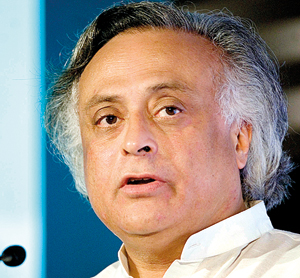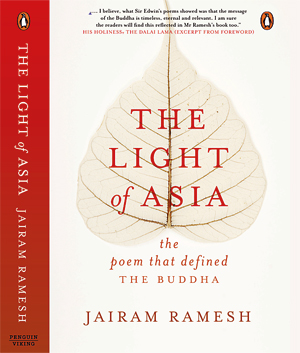Revisiting ‘The Light of Asia’ and its global impact
View(s):
Jairam Ramesh
Indian MP Jairam Ramesh’s new book ‘The Light of Asia: The Poem that defined the Buddha’ has just been released and is available on Kindle.
The author says he is not a Buddhist nor a scholar of Buddhism but a life-long student of the Buddha and his ‘teachings’. An economist and former Minister, Jairam Ramesh represents the Karnataka state in the Rajya Sabha.
In this short note to the Sunday Times, he describes the far-reaching impact of ‘The Light of Asia’ – the collection of poems on the Buddha written by the English poet and former Editor of the Daily Telegraph Sir Edwin Arnold. First published in the late 19th century, it was a book that inspired not only Buddhists for generations but also awoke the conscience of the intellectuals around the world at the time.
This biography is of an epic poem written in blank verse and was first published in London in July 1879. On its release, it immediately took England by storm and soon thereafter America and Europe too were stirred by it. The epidemic of exuberance for it would spread to other parts of the world.
The book captivated an Indian monk who remains an iconic personality—Swami Vivekananda. At about the same time, it deeply moved a young man in Colombo who has become famous in history as Anagarika Dharmapala. It caught the attention of an aspiring Indian lawyer in London in 1889. This man was later to become immortal as Mahatma Gandhi.
 A few years hence, it impacted a teenager in Allahabad who would, in 1947, become the first Prime Minister of India— Jawaharlal Nehru. Two copies of the book adorned the bookshelves of B.R. Ambedkar, the prime architect of the Indian constitution. It informed the work of men who were active in the movement for social justice especially in south India in the early part of the 20th century.
A few years hence, it impacted a teenager in Allahabad who would, in 1947, become the first Prime Minister of India— Jawaharlal Nehru. Two copies of the book adorned the bookshelves of B.R. Ambedkar, the prime architect of the Indian constitution. It informed the work of men who were active in the movement for social justice especially in south India in the early part of the 20th century.
The book had a marked influence on at least eleven literary personalities from across the world. Five of them were Nobel Laureates; Rudyard Kipling in 1907, Rabindranath Tagore in 1913, W.B. Yeats in 1923, Ivan Bunin in 1933 and T.S. Eliot in 1948.
The world of science and industry was not immune to its reach too. At the turn of the 19th century, it shaped the life of a young science student in Madras who would, in 1930, become India’s first Nobel Laureate in Physics—C.V. Raman. The Russian chemist and inventor of the Periodic Table Dmitri Mendeleev and the Scottish- American industrialist-philanthropist Andrew Carnegie had a special affinity to it. An extremely controversial figure of the British military but a legend during his time—Herbert Kitchener— would carry this book along with him wherever he went. It figures prominently in the private library of Alfred Nobel, the Swedish businessman who later endowed the Nobel Prizes.
The book was translated into 13 European, eight North and South East Asian and 14 South Asian languages. A number of plays, dance dramas and operas were to be adapted from it in different countries. In the last 50 years, it has continued to evoke academic interest and become the subject of doctoral dissertations and scholarly publications.
The book is The Light of Asia, a narrative of the life and message of the Buddha, a poem that deals less with the divinity of Buddha but more on his humanity. Sir Edwin Arnold is its author. Its publication was a milestone in the 19th century rediscovery of the Buddha. It played a key role in the Bodh Gaya movement spearheaded by Dharmapala. It occupies an important place in the historiography of modern Buddhism. Even today, the YMBA in Colombo runs “The Light of Asia” elocution contest.
I set out to understand how and why the book came to be written, who its author was and how and why it acquired its influence in country after country but more particularly in the sub-continent which gave rise to the Buddha over two and half millennia ago.


